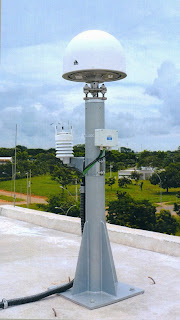The US Department of Defense and Central Intelligence Agency have been trying to persuade the US State Department not to allow Roscosmos to build several GLONASS ground-based measuring stations in the United States, alleging that they could be used for military purposes.
They fear that the structures could help Russia spy on the United States and improve the precision of Russian weaponry, the officials said.
These monitor stations, the Russians contend, would significantly improve the accuracy and reliability of Moscow's version of the Global Positioning System, the American satellite network that steers guided missiles to their targets and thirsty smartphone users to the nearest Starbucks.
The Pentagon argues that if the State Department sanctions the GLONASS station deployments, Russia might be able to increase the accuracy of its guided missiles and could also use them for intelligence activity from inside US borders.
The arguments have prompted the White House to postpone decision-making on the issue until Russia provides further information, according to anonymous sources in the US Administration and Department of State.
US congressman Michel Rogers, who earlier requested the Pentagon's estimates of the consequences of deploying GLONASS stations for US national security, said he didn't understand why the US should be interested in encouraging GLONASS, a competitor to the American GPS system, when the use of GPS worldwide gives the US obvious advantages in many respects.
Moscow rejects the suggestion that the structures have anything to do with surveillance operations, contending they are designed to improve the accuracy of Russia's version of the Global Positioning System (GPS), the American satellite network that steers guided missiles to their targets and helps with navigation.
"They don't want to be reliant on the American system and believe that their systems, like GPS, will spawn other industries and applications," said a former senior official in the State Department's Office of Space and Advanced Technology.
The monitor stations have been a high priority for Russian President Vladimir Putin for several years as a means of improving Glonass, not just to benefit the Russian military and civilian sectors but also to compete globally with GPS.
Earlier this year, Russia positioned a Glonass station in Brazil and agreements with Spain, Indonesia and Australia are expected soon, according to Russian news reports. The United States has stations around the world but none in Russia.
In May 2012, Moscow requested that the United States allow the ground-monitoring stations on American soil.
American technical and diplomatic officials have met several times to discuss the issue and have asked Russian officials for more information, said Ms. Harf, the State Department spokeswoman.
They fear that the structures could help Russia spy on the United States and improve the precision of Russian weaponry, the officials said.
These monitor stations, the Russians contend, would significantly improve the accuracy and reliability of Moscow's version of the Global Positioning System, the American satellite network that steers guided missiles to their targets and thirsty smartphone users to the nearest Starbucks.
The Pentagon argues that if the State Department sanctions the GLONASS station deployments, Russia might be able to increase the accuracy of its guided missiles and could also use them for intelligence activity from inside US borders.
The arguments have prompted the White House to postpone decision-making on the issue until Russia provides further information, according to anonymous sources in the US Administration and Department of State.
US congressman Michel Rogers, who earlier requested the Pentagon's estimates of the consequences of deploying GLONASS stations for US national security, said he didn't understand why the US should be interested in encouraging GLONASS, a competitor to the American GPS system, when the use of GPS worldwide gives the US obvious advantages in many respects.
Moscow rejects the suggestion that the structures have anything to do with surveillance operations, contending they are designed to improve the accuracy of Russia's version of the Global Positioning System (GPS), the American satellite network that steers guided missiles to their targets and helps with navigation.
"They don't want to be reliant on the American system and believe that their systems, like GPS, will spawn other industries and applications," said a former senior official in the State Department's Office of Space and Advanced Technology.
The monitor stations have been a high priority for Russian President Vladimir Putin for several years as a means of improving Glonass, not just to benefit the Russian military and civilian sectors but also to compete globally with GPS.
Earlier this year, Russia positioned a Glonass station in Brazil and agreements with Spain, Indonesia and Australia are expected soon, according to Russian news reports. The United States has stations around the world but none in Russia.
In May 2012, Moscow requested that the United States allow the ground-monitoring stations on American soil.
American technical and diplomatic officials have met several times to discuss the issue and have asked Russian officials for more information, said Ms. Harf, the State Department spokeswoman.










No comments:
Post a Comment